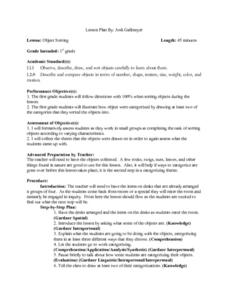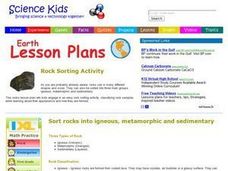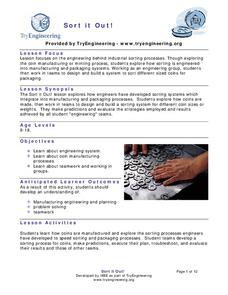DiscoverE
Sorting Solutions
It's okay to play with your food—just this once! Scholars design and create meshes and chutes to sort pasta by size and shape. They test their designs and make improvements as necessary.
Curated OER
Object Sorting
First graders follow directions when sorting objects. They illustrate how objects are categorized by drawing at least two of the categories that they sorted the objects into. Students work in small groups at completing the task of...
Alabama Learning Exchange
Yummy Apples!
Young learners listen to a read aloud of Gail Gibbons book, Apples and the story A Red House With No Windows and No Doors. They compare characteristics of a number of kinds of apples, graph them and create a apple print picture. Learners...
Curriculum Corner
Coniferous and Deciduous Trees
What are the differences between coniferous and deciduous trees? Supplement your tree lessons with a set of activities that has learners describing, naming, comparing, and reading about deciduous and coniferous trees. The activities are...
Curated OER
Sorting Gourds
Students discover different types of gourds. In this plant comparison lesson, students compare and contrast several types of gourds based on shape, color and texture. Students observe a video clip based on sorting gourds.
Curated OER
The Birds of a Feather Flock Together
Fifth graders identify all parts of an egg, and explore their importance to the life cycle of a chicken. Learners compare all sorts of birds and place them in categories based on what they look like. This five-day activity effectively...
Center for Learning in Action
Properties of Balls
Enhance your states of matter lessons with a hands-on science investigation that compares six different balls' color, texture, size, weight, ability to bounce, and buoyancy.
Curated OER
Fun Activities Using Seeds
Learners analyze the size, shape, and form of several different seeds. In this all about seeds lesson plan, students complete four activities involving characteristics of seeds. Learners observe the seeds, record information about the...
Curated OER
How Does Flowing Water Shape a Planet's Surface?
Students investigate how flowing water influence landforms. In this earth science lesson, students observe water behavior as it flows from the stream table at various inclinations. They discuss whether water shaped Mars landforms or not.
Curated OER
HOW FAST DO SEDIMENT GRAINS OF DIFFERENT SIZES SETTLE?
Students conduct an experiment using sand, a jar, and a paper clip to analyze the effects of different kinds of sand vis a vis its sediment. They graph their findings and analyze for factors of size, shape, and density.
Science Friday
Colorful Chromosomes
Everything is in the genes. Individuals observe 14 different traits of themselves. Using pipe cleaners and beads, the learners create models of a chromosome representing their traits. The class then compares and contrasts everyone's...
Curated OER
Nature Art
In this nature art lesson, students take a nature walk and collect items with different sizes, textures and colors. Students use the items they collect to make a collage.
Curated OER
Rocks and Minerals
Fifth graders examine different types of rocks and classify rocks by their different characteristics. In small groups they sort their rocks into two categories, then create three categories to sort by on a sorting worksheet. Next, they...
Curated OER
Fish Sorting
In this classification worksheet, students are given nine pictures of different types of fish. They cut them out and use a key to classify each into a category based on their characteristics.
Curated OER
Rock Sorting Activity
Learners organize rock samples according to their properties. In this earth science lesson, students predict whether they are igneous, metamorphic or sedimentary. They compare their prediction with the actual type.
Curated OER
Sort It Out
Students study classification systems by sorting Legos and determining how the different pieces are classified. They list as many attributes as possible to use for sorting.
Curated OER
Bugs, Bugs, Everywhere!
Students collect and compare bugs using magnifying lenses and graph data based on their comparisons. In this bugs lesson plan, students also make an aspirator by using a jar, tubing, and screen.
Curated OER
Classification and Attributes
Learners classify objects based on their attributes. They explain how archaeologists use classification to help answer research questions.
Center for Learning in Action
Introduction to the States of Matter
Liquids, gases, and solids are the states of matter in which scholars investigate in a lesson plan that offers in-depth information and engaging activities that look into the three states and the changes their properties make when mixed...
Curated OER
Rock vs. Mineral - Lesson #1
Students describe visual, textural, and other physical qualities of sample rock specimens. Using compare and contrast skills, students sort and classify the specimens according to their assessments of the qualities present in each....
Curated OER
Science- Unit on Matter- Liquids-
Second graders discover that everything is made of matter. they determine the properties of liquids and that like solids, liquids can be grouped or classified according to properties or qualities. they assess that solids have a definite...
Curated OER
Tree Talk
Learners discuss trees, leaves, and the growth process For this 1st - 3rd grade lesson plan, students identify various types of leaves, recognizing the differences in size and shape. Learners create tracings of various leaves to...
Curated OER
Polymer
Students investigate polymers by completing 3 experiments. In this polymer lesson plan, students mix plastic with acetone, they create polyurethane foam, they make slime and build a polymer model once their polyurethane foam is set. ...
Curated OER
Biodiversity
Students investigate the diversity of temperate forests and tropical rainforests. They catch and observe local insects, sort leaves and insects on a chart, listen to the book "A Walk in the Rainforest," and create a class bar graph that...























